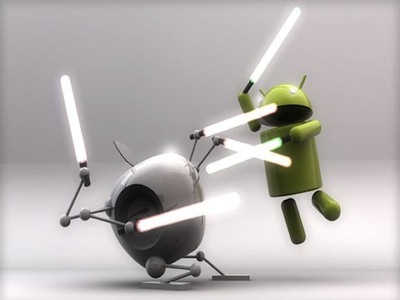Apple Patent Lawsuit Against Google's Motorola Dismissed
A U.S. district court judge has dismissed Apple's patent case against Google-owned Motorola Mobility.
Judge Barbara Crabb threw the case out, subsequently resulting in Apple having to successfully appeal against her decision to revive the case; the firm can't refile the lawsuit through another district court.
Apple filed the lawsuit against Motorola Mobility during the March of 2011, with the latter demanding 2.25 percent of all net sales on iOS products that utilizes essential industry standard patents. Businesses who own essential industry patents are expected to offer them under licensing terms that are FRAND: "fair, reasonable, and nondiscriminatory".
The iPhone creator accused Motorola of seeking excessive royalty payments for its patents related to Wi-Fi technology and video streaming.
Apple had been progressing towards victory against Motorola until last week, when the latter filed a motion that would require the former to accept whatever amount the court decided was a fair royalty rate.
It decided, however, to dismiss the motion by stressing it would only agree to a court-determined rate should the rate not exceed $1 per iPhone sale.
Contact Us for News Tips, Corrections and Feedback
Get Tom's Hardware's best news and in-depth reviews, straight to your inbox.

Zak Islam is a freelance writer focusing on security, networking, and general computing. His work also appears at Digital Trends and Tom's Guide.
-
azraa Going completely off topic here, but I remember my grandfather working at the local power plant, between control rooms and massive outdoor converters, with a Motorola. That thing was wireless, but freaking huge, with very limited range and a huge charger as well. This kind of devices were the progenitors of modern cellphone comms. After all, Motorola has licenses on very relevant things, and Motorola back in the day was the leading edge in radio coms.Reply
Good guy motorola, lets all use its many research years products, doesn't sue.
*meme* -
A Bad Day There's only a lesser evil in the software industry. The patent warfare has no saints in it, except for an occasional sane judge.Reply -
ddpruitt Apple's definition of reasonable: If we made something like it first you owe use $1 billion, if you made it first we aren't paying ANYTHING.Reply
Right, at least one judge that has a brain. -
bustapr motorola asking for more or less $14-$15 for each iphone and apple will only accept that the court decides $1 per phone? um, Im not quite sure if I understood this entire thing correctly, the article is worded a little wierd.Reply
what I understood from this article was apple sued motorola because motorola had sued them and wanted $2.25 in licensing per phone. motorola sued filed a motion that would require apple to accept a license given by the court. apple got cocky in court and judge threw case out.
Can somebody clear that up? my bad if the question is annoying. what happened to the license motorola wanted? -
InvalidError It is not $2.25 per device, it is 2.25% of the price which would be $12-16.Reply
When Apple wants to license their trivial/useless bounce-back scroll and other similar patents under "FRAND" terms, they ask for an outrageous $30-50 per device. When someone else licenses their critical wireless patents under FRAND terms, Apple only wants to pay them $1.
You can have a wireless device without any of Apple's software patents but Apple cannot make a device without infringing hundreds of hardware patents... Apple might want to sober up and think for a minute... the last couple of judgements against Apple seem to indicate Apple might fall off a cliff if they continue walking down their current path.
Imagine if Apple ends up pissing off their suppliers and competitors enough with lawsuits for them to go to court asking to rescind Apple's FRAND privileges as punishment for Apple's frivolous lawsuits. Seeing how badly things seems to be evolving, I'm starting to think this is the only way Apple can be convinced to start cross-licensing instead of suing everyone. -
vaughn2k "Apple Patent Lawsuit Against Google's Motorola Dismissed"Reply
Because apple thinks they're always the first..
Yeah, and here's another one...
http://au.ibtimes.com/articles/402216/20121107/iphone-vs-ifone-apple-loses-mexican-tech.htm
http://gadgets.ndtv.com/mobiles/news/apples-iphone-loses-to-ifone-in-mexico-case-288581
-
Solandri bustaprCan somebody clear that up? my bad if the question is annoying. what happened to the license motorola wanted?Google for patent royalty rates. You'll find they're typically 5%-25% of the sale price of the product. For "essential" patents they're typically 1%-3% (not per patent, per pool of patents held by a company). I did about 5 minutes of googling and 30 minutes of reading which came up with the above numbers. When GSM first came out, about 30%-40% of the cost of a handset was patent royalties. For LTE, the total royalties work out to about 14% of the price of the handset.Reply
http://www.investorvillage.com/uploads/82827/files/LESI-Royalty-Rates.pdf
When Google bought Motorola, one of the conditions for government approval of the deal was that Motorola had to license its patents under fair, reasonable, and non-discriminatory terms (FRAND). That meant their royalty rates had to be reasonable, and the same for all companies who wished to license. Motorola has been asking 2.25% of all comers for its patents.
Motorola asked Apple for 2.25% for its set of patents on wireless communications, less if Apple were willing to cross-license. Apple said it shouldn't be based on the price of the handset. They wanted $1 per handset max (about 0.2%), no cross-licensing, and no liability for their past patent violations (apparently Apple has refused to license since the first iPhone). Motorola said no, 2.25%. Apple walked.
They cited other cases where Motorola licensed for less than 2.25%, but omitted that those were cross-licensing deals. Motorola accepted less than 2.25% in exchange for licenses to patents held by the other company. Since Apple refused to cross-license, I don't know why they'd even think those deals were comparable.
Apple filed a lawsuit against Google/Motorola asking the court to determine what was a fair and reasonable royalty rate. While presenting the case, they essentially told the court they wanted Motorola to be bound by whatever rate the court decided. But if the court decided more than $1 per handset, they themselves would not be bound by the court decision. The judge decided (based on her statements since she hasn't issued a written decision yet) that if her decision wasn't binding, then there was no point involving the court, and dismissed the case with prejudice (meaning Apple can't re-file it in a different district). -
unksol So let me get this straight. Motorola has REAL patents on REAL tech. And is required to license them on "fair, reasonable and non-discriminatory" terms. Fine. They are standards. That makes sense. But apple uses their tech, without permission, that is required for their phone to even work, and refuses to pay fair licenses and demands licencing terms so insane and DISCRIMINATORY that a court threw them out.Reply
But apple can sue on things they stole from prior art and win? what. The. hell.
